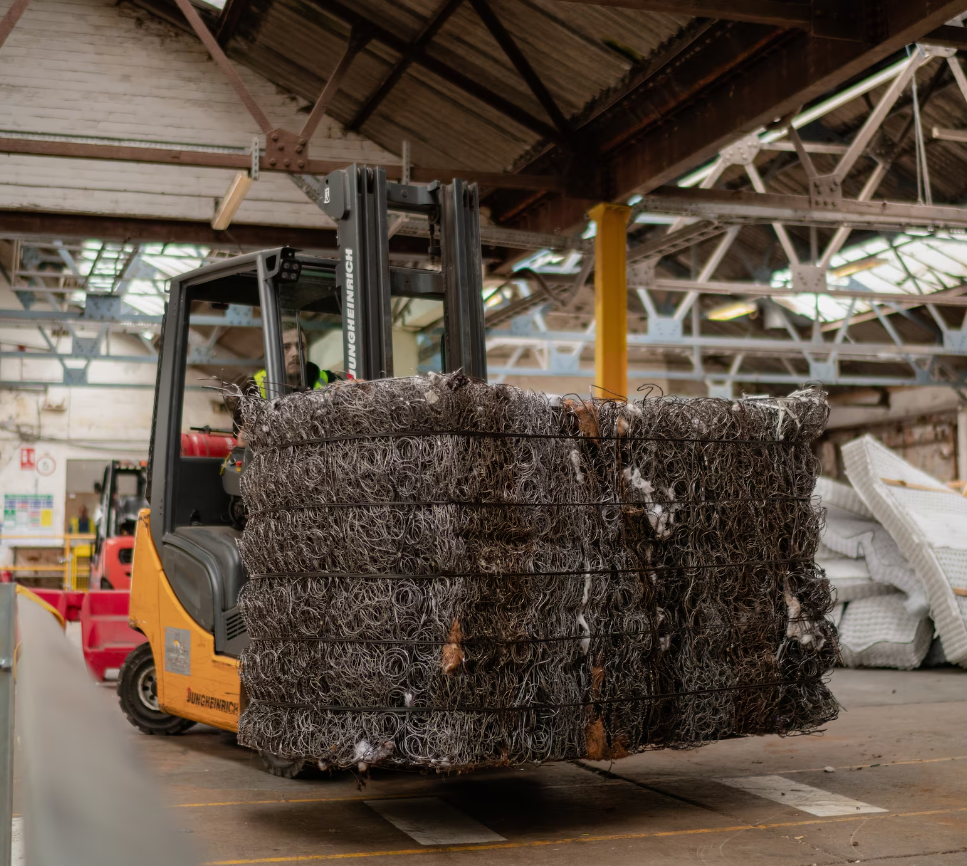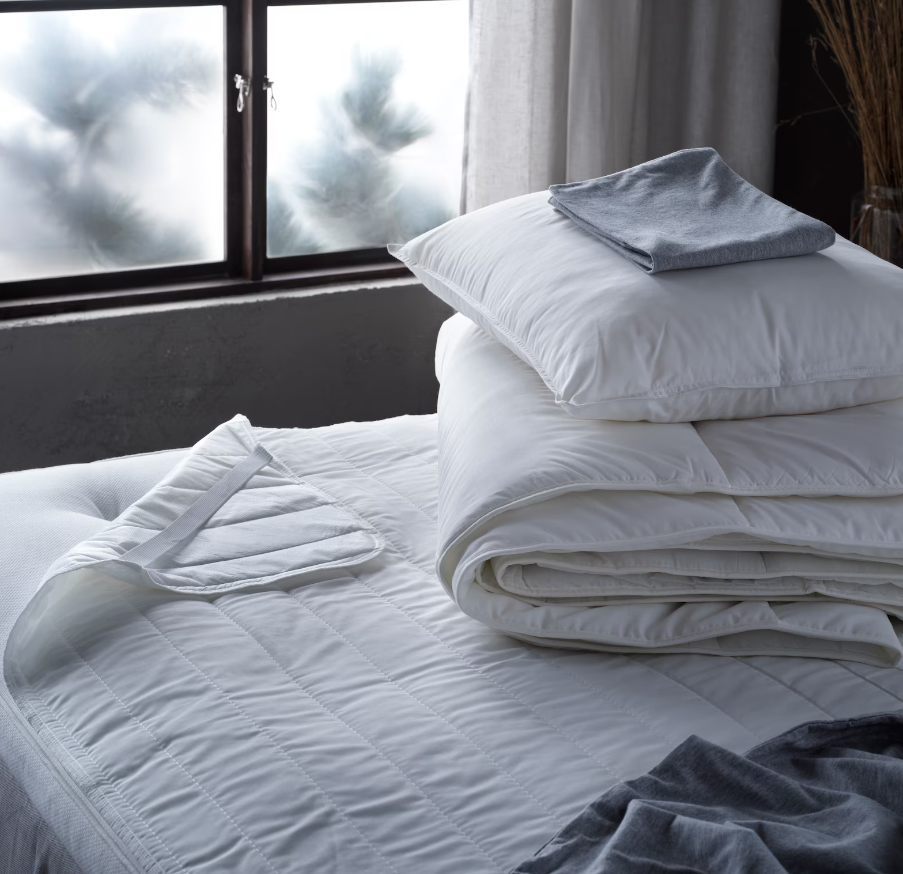In the next part of our ongoing sustainable series, we take a look at the recent news from furniture retailer IKEA following the launch of its new mattress removal and recycling scheme.
In a new collaboration with The Furniture Recycling (TFR) Group, IKEA’s new mattress removal and recycling scheme aims to give UK customers a convenient way to recycle old mattresses that would otherwise go to waste. The scheme will strengthen the range of sustainable services on offer to IKEA customers, by transforming mattresses into valuable raw materials that are fed back into the economy.
IKEA
The new mattress removal and recycling scheme will give UK customers a convenient and sustainable way to recycle their old mattresses. The service will ensure that mattresses across the UK are transformed into valuable raw materials that are fed back into the economy and reused.
IKEA customers can book a collection for their mattresses, either online or in-store for £40 per item. Following collection, mattresses are transported to a dedicated recycling facility operated by IKEA partner, The Furniture Recycling (TFR) Group – the UK’s leading mattress recycling and circular economy specialist.
TFR Group diverts 100% of the mattresses it collects or receives from landfill, by deconstructing them manually using specialist cutting tools – enabling the materials to be separated into their component parts, which are then sanitised for onward processing. Since 2012, TFR Group has recycled more than 3.5 million mattresses, with 30,000 tonnes of material flowing back into the economy.
In 2022, RetourMatras, a Netherlands-based mattress recycling company that is co-owned by Ingka Investments – the investment arm of Ingka Group, the largest IKEA retailer – acquired TFR Group. This investment has enabled the business to triple its dismantling capacity, which now stands at 1.5 million mattresses per year.


Beyond recycling, IKEA also plans to use TFR Group’s mattress rejuvenation service in the near-future, which involves a bespoke sanitation process for returned mattresses. This ensures returned mattresses do not go to waste, and instead are cleaned to NHS standards and verified to be of as-new quality via robust quality assurance checks – ready for resale at discounted prices or redistribution to support local communities.
The launch of the new mattress removal and recycling scheme strengthens the retailer’s existing sustainable services offering. This includes in-store areas, now known as ‘Re-shop and Re-use’, where IKEA can recycle and give products a second life, offering free spare parts and an attractive range of affordable goods including discontinued items, ex-display articles and pre-loved furniture – traded back to IKEA through the BuyBack & Resell service. BuyBack & Resell encourages customers to sell back eligible pre-loved goods in exchange for store credit, so these pieces can then be purchased by a new customer and reused.
In addition to this, IKEA has recently piloted a new ‘car boot’ sale concept at its Milton Keynes and Cardiff stores, to support customers in repurposing their pre-loved belongings and giving them a new lease of life.
Greg Lucas, Sustainability Manager at IKEA UK, said: “We’re very excited to have our new mattress removal and recycling service up and running in collaboration with The Furniture Recycling Group, which is transforming old mattresses that would otherwise go to waste, back into valuable raw materials that can be used again and again.
“Partnerships like this are crucial to overcoming long-term environmental challenges like mattress waste and advancing our People and Planet Positive journey, while supporting as many customers as possible in living a more sustainable life at home.”
A cumbersome and bulky waste stream, mattresses are manufactured using up to around 19 different materials, making them notoriously difficult to recycle. In the UK, around 6.4 million mattresses were disposed of in 2020, according to the National Bed Federation, with the majority ending up in landfill.
This represents thousands of tonnes of waste – which is taking up limited space in refuse centres nationwide and damaging the environment. Recycling a mattress also saves 76 kgs of CO2 emissions (as compared to incineration). This means that if the 6.4 million mattresses disposed of in the UK were recycled, over 485 million kgs of CO2 emissions could be saved.
Alongside expanding recycling capacity in the UK, RetourMatras and TFR Group are working together to make mattress recycling more efficient by optimising transport, dismantling and material recoverability – ultimately working towards a fully circular mattress value chain.
Nick Oettinger, CEO and founder of TFR Group, added: “We are proud to support IKEA UK, helping to further strengthen the business’ sustainability offering through our mattress removal and recycling service.
“By stripping each mattress back and recycling its component parts, together we are able to contribute to the circular economy and ensure that a bulky waste stream is recycled and diverted from landfill, delivering long-term environmental benefits.”
Ingka Investments, the investment arm of Ingka Group – owner of IKEA, has also recently invested in an offshore wind project portfolio in Ireland and UK, securing a 20% stake. The portfolio is managed by Source Galileo, a London and Dublin based European renewable energy company, which is developing 10GW of offshore wind to electricity and hydrogen production off the northwestern coasts of Europe.
The latest investment is part a EUR 6.5 billion initiative to support 100 percent renewable energy consumption across the IKEA value chain and beyond. Ingka Investments has invested and committed more than EUR 4 billion into renewable energy projects to date.
Frederik de Jong, Head of Renewable Energy, Ingka Investments, commented: “This partnership is a further step to expand our investment activities to address climate footprint reduction well beyond our retail consumption, and into the IKEA value chain. We are looking forward to working closely with Source Galileo to make a significant contribution to the achievement of Ireland, the UK and Europe’s decarbonised energy goals.”















